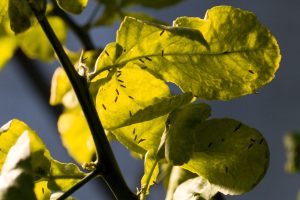Scientists at the University of Florida are testing a new type of citrus tree that can fight off the tiny insects responsible for citrus greening.
While the genetically modified tree has only been tested so far in the lab and the greenhouse, it is one of the most promising discoveries to date in a challenge that has plagued growers, researchers and consumers as Florida’s citrus industry has plummeted over the past two decades.

The approach involves inserting a gene into a citrus tree that produces a protein that can kill baby Asian citrus psyllids, the bugs that transmit the greening disease.
That gene normally occurs in a soil-borne bacterium called Bacillus thuringiensis (Bt).
This gene provides instructions for the new citrus tree on how to make this protein. Thus, when you put the gene into the tree, the plant produces the protein that kills psyllids.
While this approach can kill baby psyllids, UF/IFAS scientists are close to finding a solution to control the adult pests.
Read more about the research here.
###
ABOUT UF/IFAS
The mission of the University of Florida Institute of Food and Agricultural Sciences (UF/IFAS) is to develop knowledge relevant to agricultural, human and natural resources and to make that knowledge available to sustain and enhance the quality of human life. With more than a dozen research facilities, 67 county Extension offices, and award-winning students and faculty in the UF College of Agricultural and Life Sciences, UF/IFAS brings science-based solutions to the state’s agricultural and natural resources industries, and all Florida residents.
 1
1
